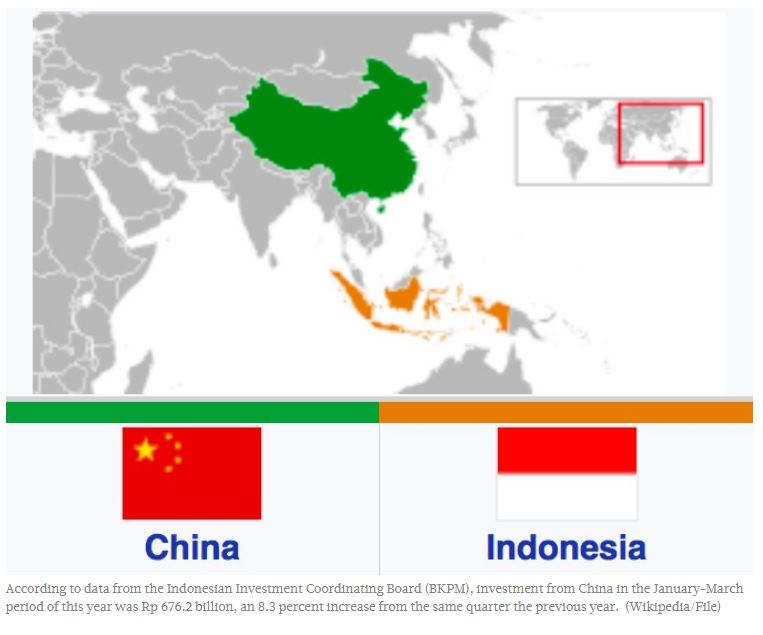Chinese investments trending in Indonesia
In the past few years, Indonesia has seen more and more investments from Asian powerhouse China.
In 2017, China was ranked as the country with the third-largest foreign investment in Indonesia at US$ 3.36 billion, a significant increase from $2.66 billion in 2016.
It seems that the trend is here to stay.
According to data from the Indonesian Investment Coordinating Board (BKPM), investment from China in the January-March period of this year was Rp 676.2 billion, an 8.3 percent increase from the same quarter the previous year.
BKPM head Thomas “Tom” Lembong said such a phenomenon was a “mathematical trend”, as China is one of the largest economies and the most populous country in the world.
“China is the number one trading partner for more than 120 countries and the main source of foreign tourists for Indonesia and for many other countries,” Tom told a press briefing in Jakarta on Monday.
Tom said ongoing smelter projects, particularly the ones in Sulawesi, which are managed by Chinese investors, were among the most reliable investments for the government as they could absorb a large amount of capital.
Since China introduced its Belt and Road Initiative in 2013, its outbound investments, including to Indonesia, increased significantly. The initiative is an ambitious road, rail and construction project spanning dozens of countries across Asia, Africa and Europe.
Last month, Indonesia and China signed five contracts worth $23.3 billion as part of the initiative. The contract consists of several infrastructure projects such as a hydropower plant development and a facility to convert coal into dimethyl ether, among other projects.
Indonesia is also seeking Chinese investment in some of its economic corridors.
The government this year has set an investment target of Rp 765 trillion. In the January-March period, the BKPM recorded Rp 185.3 trillion in investments, or 24 percent of the target.
The figure is an 11 percent increase from the same period last year.
Foreign investments still dominate investments at Rp 108.9 trillion, while domestic investments make up the remainder at Rp 76.4 trillion. Meanwhile, the top five countries or territories of origin for investments are all in Asia: Singapore, Japan, South Korea, China and Hong Kong.
Tom said the results were a reflection of the reforms implemented by President Joko “Jokowi” Widodo’s administration. More incremental reforms, he said, were prepared to ensure the investment target would be achieved this year.
“To sustain this kind of result is very tough for us,” Tom said. “It would take a much more radical solution than what the government has done.”
He added that some of the reforms had been met with controversy this year, such as Presidential Regulation No. 20/2018 on the utilization of foreign workers, which drew strong and somewhat political reactions as it is considered to privilege foreigners for job access in Indonesia.
However, businesspeople have applauded most of the other reforms, such as the Finance Ministry’s plan to extend its tax holiday program as well as the ambitious online single submissions (OSS) system.
“It will take these reforms a while for their actual impact to be seen, so as much as they are a good start, we still need to push their implementation,” said Tom.
Responding to the results, Indonesian Chamber of Commerce and Industry (Kadin) deputy chairman Shinta W. Kamdani agreed that the government still needed to step up its reforms in order to reach the desired
gains.
She noted that the OSS system would especially help investors as they were often confused by overlapping and mismatched regulations from the central and regional governments.
“The government should further harmonize the relationship between the regional and central [government],” Shinta told The Jakarta Post over the phone. “Furthermore, they should also remember that what is more important than new incentives is consistency for all its policies because investors are always here for the long term.”
Meanwhile, Eric Sugandi, a project consultant for the Asian Development Bank (ADB) Institute, said the government should make sure not to undermine domestic investors with its reforms.
Source: http://www.thejakartapost.com/news/2018/05/02/chinese-investments-trending-in-indonesia.html


 English
English




